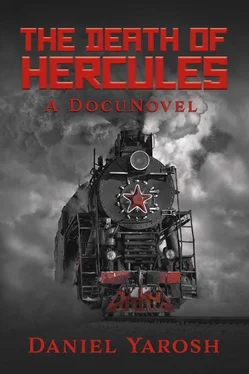“Zalmund?” she creaked.
No answer.
“Zalmund?” Her voice cracked.
“Yes, yes. It is me. The police…” His voice trailed off and she did not hear.
Deena flung the door open. Their eyes met for a moment, and Zalmund had to look away. He feigned tiredness, and she sensed his distance.
“You are back.”
“Yes.”
“I was worried.”
“The flu. They closed the streets. Here. I couldn’t get through.”
She angled her head to the right and looked at him carefully. “Are you all right?” Her face softened.
“I had to stay out.”
“Yes?” Her voice held a hint of sarcasm.
“Yes, Deena, I had no choice. I need to lay down.” He strode past her into the apartment. As he passed, she touched his forearm. He turned, she looked up, and their eyes met. She hugged his waist and he covered her in his arms. She wanted so much to believe that she could put this out of her mind. She couldn’t just now. They held each other in warmth for a time, but the physical heat only briefly clouded her suspicion. She smelled him carefully, and thought she detected a perfume through the damp wool and cigar stench.
“Dormirovich called,” she said finally.
“Who?”
“Down the hall. You know. He was worried about me.” She looked up at him with her hands about his waist. Her look was a warning to him.
“He was?”
“Zalmund, people knew you were gone. Three days, you were gone.”
“The flu.”
“I know.” Her voice said she knew what he said and what he didn’t say.
He hugged her, rocking back and forth. What could he do? Had he lost this?
In the few days that followed Zalmund took Deena to the fashion district. He used too many of the notes stashed beneath the floorboards to buy her dresses and silk scarves, so difficult to get in the middle of war. They sipped coffee under the café awnings and laughed. For the first time in many days, Deena relaxed. She put away from her mind where he had been, as well as what was next. Her feelings were not so much different than that of most of Kyiv, which floated on the balloon of currency, confidence, and blind ambition, in the face of ruthless neighbors close by and closing.
Zalmund knew that any moment Dragomirov might call for his first assignment. It could be a phone call, a messenger, or a bullet to Deena’s head.
Suddenly there was a commotion to the right of them in the sidewalk cafe. A man in a black shirt and grey pants had struck an old and tattered Jew from the sidewalk into the street. Into the gutter, actually. He cursed at him and walked away. Now, as if orchestrated, some young thugs in wool caps, knee-high britches and steel-toed work shoes with holes in the soles, came to the curb. One spat on the prostrate figure. “Juden!” he sneered. The others smirk. “You brought this plague. Now take it away! Leave us in peace! Go, give the plague to your Bolsheviks.” Another stepped from the sidewalk and kicked the old man in the thigh. “Bolshevik pig! Eat this!” He scraped dirt from the street into the old man’s face. The young men laughed in a guttural growl and walked away.
In mid-October the spirit of Kyiv had changed, almost like a cool front blowing in over balmy skies. The faces of the people on the street were pinched between the eyebrows, and their thoughts were self-absorbed. The waiters were a little haughtier, the shop keepers a little crisper. Less time was spent in casual banter at the cafes. Newspaper sales went up, and the news was not good. Dragomirov called once, and Zalmund sold him a pass. He seemed to Zalmund to be distracted and intense. They did not speak of larger plans, but Dragomirov asked Zalmund about safe houses in Moscow.
“For you?”
“Don’t be stupid. I have a customer.”
“I don’t know…”
“Think!”
“I’ll get back to you.”
“Forget it, it will be too late.”
October 9, 1918 was the first attack on the Brodsky synagogue, a 300-year-old red brick building with magnificent windows facing the East. A bundle of wood and newspapers was set on fire at the steps on Friday night, while the congregation prayed inside. This was one act that the Germans and the Ukrainians could agree. A week later bricks were thrown through the stained-glass windows, and Jews were beaten as they left Saturday morning services.
Deena and Zalmund react differently to the news. Deena was horrified because she saw it as one more step on the slide down to world madness, but Zalmund sensed the personal danger. It was possible that the conflict could be resolved by blaming the Jews and heaping the two years of war and disease on them.
“My family didn’t hate all Jews,” she said. “They just didn’t like you.”
“And when they read in the paper about the Brodsky synagogue, will they shake their heads, or nod their head?” he said
“They didn’t like you because you were with me. Your family didn’t like me any better.”
“My family didn’t know you,” he said.
“They didn’t want to know me,” she said.
“I do,” and he embraced her. He hugged her and rubbed her back. He was afraid to say how much he needed her. He smelled her hair and grew weak. She was his connection to hope. He felt a knot in his chest, and he squeezed her to release the doom from his heart.
Kyiv, like almost every major city in eastern Europe, had two stories to tell. The grand boulevards and the baroque public buildings with gilded woodwork spoke of a majestic Imperial period, which grew more romanticized as the mechanical age crept in. But just a few blocks from the façade, like their Podol district apartment beyond the St. Andrews Church, another Kyiv moaned. There the bricks in the buildings were uneven, the plumbing leaked, and the filth in the street moved only with the storm rain. A grey film hugged the building stones that matched the overcast skies of Autumn. The people worked hard, when they had it, and they knew how close to the edge they lived.
Zalmund noticed immediately, before he put the old iron key in the rusted keyhole, that fresh wood was showing through the tired brown stain where their apartment door fit into the jamb. He pushed the door open without the key, and the bracket in the door jamb clattered to the floor. He looked back at Deena with a panic that he quickly controlled. He held up his hand and then turned back to the door.
“Hello?” He paused. No answer. Now he thought that was a stupid thing to say. But it was too late. If they were inside, they knew he was home.
“We aren’t coming in until you say you are there.” No answer.
Zalmund turned and shooed Deena down the stairs. As they passed the apartment on the floor below theirs, the door was ajar, and a nose poked through the open space. Zalmund started to open his mouth to speak to the old woman, but the door quickly closed. Whatever she had seen or heard had scared her, he thought.
Zalmund and Deena left the building. After a walk around the block, they came back and sat down on the steps of a building across the street and a few doors down. Their apartment window faced the tenement to the left, so they could not see in. They waited and watched. Deena calmed her nerves, and then her anger, but she never asked why this might happen. By dusk Zalmund felt foolish. When it was dark, and no light appeared from the window, they went back inside.
The apartment had been ransacked. Their few possessions scattered on the floor. Deena’s wardrobe of impractical dresses lay in an isolated heap. Each one had been deliberately slashed. She knelt and cried.
“Why?” she finally spoke, looking up to Zalmund, who continued to search the small bedroom.
“To send a message. Since they found nothing.”
“Who?”
Читать дальше












